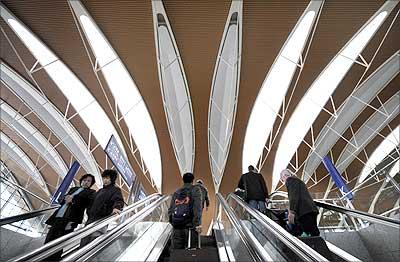 The speed at which China is transforming itself is not just impressive; it is scary. Can such massive cities come up in the twinkling of an eye? Can such elaborate infrastructure be put in place in a jiffy? What is the engine that drives this frenetic pace of progress? Is there a target such an engine cannot achieve if it wants to?
The speed at which China is transforming itself is not just impressive; it is scary. Can such massive cities come up in the twinkling of an eye? Can such elaborate infrastructure be put in place in a jiffy? What is the engine that drives this frenetic pace of progress? Is there a target such an engine cannot achieve if it wants to?
When I visited Shanghai less than 10 years ago, Pudong was a sprawling marshland which had just been drained to make the soil ready for construction activities. The first high-rise hotel was coming up and a landmark TV tower was rising.
Today Pudong is a marvel of modernity, a glittering financial and corporate centre with facilities and institutions bigger and better than the best in the world. A fairyland kind of suspension bridge, for example, is the most spectacular link across the Huangpu river that used to separate Pudong from Shanghai. There are several other bridges, several ferry services and several state-of-the-art underwater tunnels that make that separation a thing of the past.
Consider the road system. Shanghai was a notoriously congested city -- a tangled web like central Mumbai. It was impossible to untangle it. But the authorities found a way: Put an elevated road system over the city's "ground floor". Today an overhead network of crisscrossing flyovers make it possible to go from point A to point B without traffic lights. From the centre of Pudong I drove for 36 kilometres before the car was stopped --by a tollgate.
This determination to do what is necessary -- and do it quickly and efficiently -- is what is helping China catch up with lost time.
They do everything on the grand scale, planning for a hundred years ahead. The new Pudong international airport will be good enough for virtually a century. It is about 40 kilometres from the city and the magnetic levitation train covers the distance in eight minutes.
Compare that with Bangalore's agonising access problems over the new airport.
All about the Bengaluru International Airport
There is nothing that China has achieved which others cannot. The difference is that China has the national will to achieve it, and the leadership to turn that will into action. We may say that the authoritarian system facilitates quick execution of plans unlike in a democracy. Is that an argument we want to push when authoritarianism is so palpably constructive as it is proving in China, and democracy so chaotic as it has become in India?
Perhaps the key lies elsewhere. Aldous Huxley provided an insight as far back as in 1926. Talking about 'the dense, rank, richly clotted life' of Shanghai, he wrote: 'Each individual Chinaman has more vitality, you feel, than each individual Indian or European, and the social organism composed of these individuals is therefore more intensely alive than the social organism in India or the West.'
In other words, whether it is Communism or capitalism, the Chinese have a national character that tends to give them an edge over others.
Image: Pudong international airport is about 40 kilometres from the city and the magnetic levitation train covers the distance in eight minutes. Photograph: Mark Ralston/AFP/Getty Images
T J S George lived as a journalist in Hongkong through the 1960s and 1970s. Now a Bangalore resident, he last visited China in 2000.





